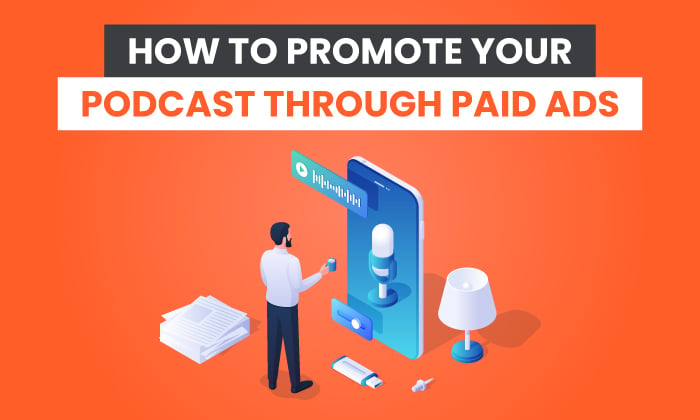
Growing a podcast is a challenge.
There are 1.75 million podcasts in the world and more than 43 million episodes.
There’s a lot of competition, but podcast consumption has also increased exponentially.
Thirty-seven percent of US adults have listened to podcasts, a three-fold increase compared to the last ten years. Podcast listeners also tune in to an average of seven different shows per week, and 80 percent listen to the entire or most of each episode.
The podcast industry has a bright future. Both the number of podcasts and podcast listeners have spiked.
One of the most effective ways to promote your podcast audience is using paid ads.
Here’s how to do it.
Why Should You Create a Paid Ad to Promote Your Podcast?
Paid ads provide a fast and effective way to promote podcasts and increase brand awareness. Unlike content marketing, which takes a ton of time, paid ads can quickly grow your audience in a matter of weeks.
Here are a few other benefits of paid ads:
- Widen reach: Not getting enough listeners? Paid ads are an effective tool to boost your audience. Ad targeting makes it easier to get your podcast in front of your target audience.
- Set your podcast apart: What topics do you discuss on your podcast? Why should people tune into your episodes? A PPC ad can highlight what sets your podcast apart from its competition.
- Cost-effective advertising: PPC is a cost-effective way to promote your podcast because you pay based on clicks, impressions, or conversions. Most social media platforms also provide metrics on your advertising results, so you get your money’s worth.
Types of Paid Ads to Promote Your Podcast
A wide range of platforms offer paid ads you can use to promote your podcast, such as Facebook, Google, Instagram, Snapchat, TikTok, and Discord. Below, we’ll cover why you should consider each platform and the types of ads they offer.
Google Ads
Google ads appear when users search for your business or use business-related keywords in their Google search. This lets you reach one of the widest audiences of any platform.
Types of Google ads include:
- text
- responsive
- image
- app promotion ads
- video
- product shopping ads
- showcase shopping ads
- call-only ads
Facebook Ads
Facebook ads let you promote your social media page, posts on your social media page, or your podcast website. You can target users based on their demographic, geographic location, or profile information. Facebook ads are also an ideal way to build a community around your podcast, helping it grow.
Types of Facebook ads include:
- image
- video
- carousel
- instant experience
- collection
Instagram Ads
Instagram ads are ideal for those who want to promote podcasts through high-quality photos and gorgeous visuals. You can also share short clips, highlight behind-the-scenes images, or share links to podcasts. With more than a billion monthly active users, Instagram reaches a massive audience.
Types of Instagram ads include:
- images
- videos
- carousel
- stories
Snapchat Ads
Snapchat ads leverage unique advertising features such as augmented reality, face swap, and engaging filters to boost brand awareness and promote podcasts. These ads can also reach a younger audience, with the average Snapchat user being between 15 and 25 years of age.
Types of Snapchat ads include:
- single image or video ads
- filters
- lenses
- story ads
- product catalog ads
- commercials
TikTok Ads
TikTok ads require users to set up an ad campaign to reach their target audience within 24 hours. The platform is newer, which means ads can be more affordable than more established platforms like Google and Facebook.
TikTok ad types include:
- in-feed ads
- branded hashtags
- top view ads
- branded effects
- brand takeover
Discord
Discord Servers or chat rooms are filled with like-minded people who want to communicate on a game, topic, or any point of interest. If you have a Discord server dedicated to podcast listeners, head to Advertise Your Server (AYS). You can promote your server and attract dedicated listeners.
LinkedIn Ads
LinkedIn ads are ideal for podcasters who want to target a professional audience, such as business owners or working professionals. While it might not be the right platform for all podcasts, LinkedIn still boasts more than 37 million members and has high engagement rates.
Types of LinkedIn ads include the following:
- single image ad
- carousel image ad
- video ad
- text ad
- dynamic ad
- sponsored messaging
How to Decide Which Paid Ad Campaigns Are Right for Your Podcast
Since several platforms offer paid ads, which is best to promote podcasts? There is no one right answer; you’ll need to consider your niche, audience, budget, and ad types each platform offers.
We discuss all these factors in-depth below.
1. Niche
Your podcasts’ niche or industry plays a big role in deciding which platform to choose.
Are you selling software for the B2B industry? PPC campaigns on LinkedIn will be key to attracting like-minded podcast listeners. Are you a beauty or lifestyle brand? Instagram ads with gorgeous models and pretty products will likely drive the best results.
Check out my social media marketing guide to find the ideal platform based on your industry.
2. Audience
Most paid ad platforms have distinct ad targeting capabilities. Before you start creating ads, make sure you know who you want to reach.
What are their likes and dislikes? Where are they located? What is their gender?
The more information you have, the easier it will be to create targeted ads your audience is likely to respond to.
If your podcast wants to pique the interest of Gen Zers, think about launching TikTok ads. A food-themed podcast could also use gorgeous food-themed pics on their Instagram paid ads.
The Pew Research Center has a social media fact sheet where you can determine the preferred platform based on demographic data.
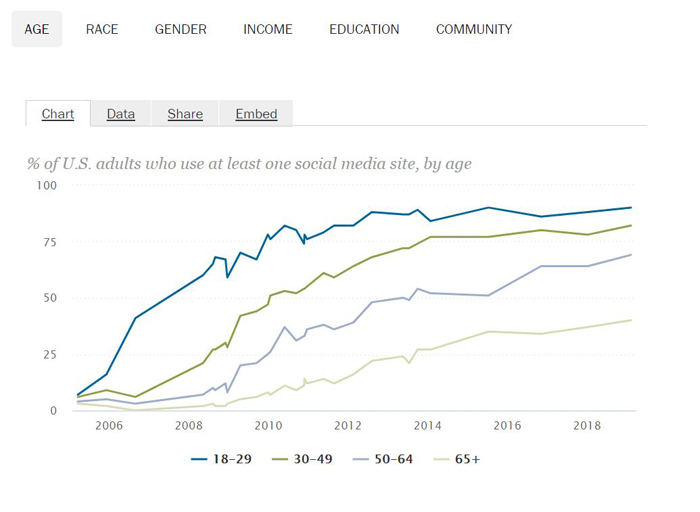
3. Cost
Every platform has a distinct bidding process. Advertisers are charged based on their goals or objectives such as clicks, impressions, or conversions. The average cost will also differ depending on your niche or industry.
To maximize your revenue, consider the cost of the ads and its results. You can also run a survey of your listeners to determine the platforms where your audience is most active.
4. Ad Types
Different ad types will yield different results and perceptions of your podcast.
Some ad types will resonate with your audience better. You’ll need to experiment with different ad formats to find out which works best for your target audience.
For instance, advertisers who want to launch a unique branded campaign using filters or lenses could focus on Snapchat. Those who find carousel ads effective may leverage Facebook or Instagram.
Take the time to research your audience and test a few platforms. If one type of ad converts at a higher rate, you’ll want to stick to platforms that offer that ad type.
Tracking and Measuring the Success of Your Podcast Promotion Campaign
Besides your iTunes ranking, there are several other ways to track the effectiveness of your paid podcast campaign. Here are a few metrics and KPIs to gauge the success of your paid ads campaign.
- Direct and referral traffic: Refers to the spike in traffic due to paid ad campaigns posted on social media websites or search engines.
- Downloads per episode: The number of times your podcast episode is downloaded on a computer, mobile device, or tablet.
- Exclusive offer code: Consists of a coupon code which is read on-air by the host to track conversions linked to the ad campaign.
- Cost per thousand (CPM): Refers to the amount the advertisers pay for a thousand impressions on the paid ad.
- Cost per acquisition (CPA): The amount spent to acquire a new podcast listener or customer as a result of the paid ad campaign.
- Bounce rate: The rate at which people leave the website without continuing to browse to other pages. Most PPC ads lead potential listeners to the podcast’s website or a landing page. If you experience a high bounce rate, consider customizing your landing page to improve results.
- Time on site: This refers to the average time that interested listeners spend on their visit. The time spent on your site can determine whether podcast listeners are engaged with your episodes.
- Conversion rate: The average number of visitors who converted into podcast listeners.
- Return on Ad Spend (ROAS): The profit earned after spending a specific amount on launching paid ad campaigns.
- Customer Lifetime Value (CLV): Refers to the amount spent throughout your relationship with your customer.
- Budget attainment: Amount spent on PPC ad campaigns monthly
Tips for Creating Paid Ads to Promote Your Podcast
At this point, you’re probably looking to create your podcast ad. As someone who has launched many PPC campaigns, here are tips to promote podcasts through paid ads.
1. Choose the Right Advertising Image
Podcasts may be audio, but people are attracted to PPC ads because of images. Use an attention-grabbing image that matches the theme and subject of your podcast.
The Tim Ferris show has a video ad with a compelling illustration of the podcast host. Clicking the play button plays a persuasive quote that encourages listeners to check out the entire episode.
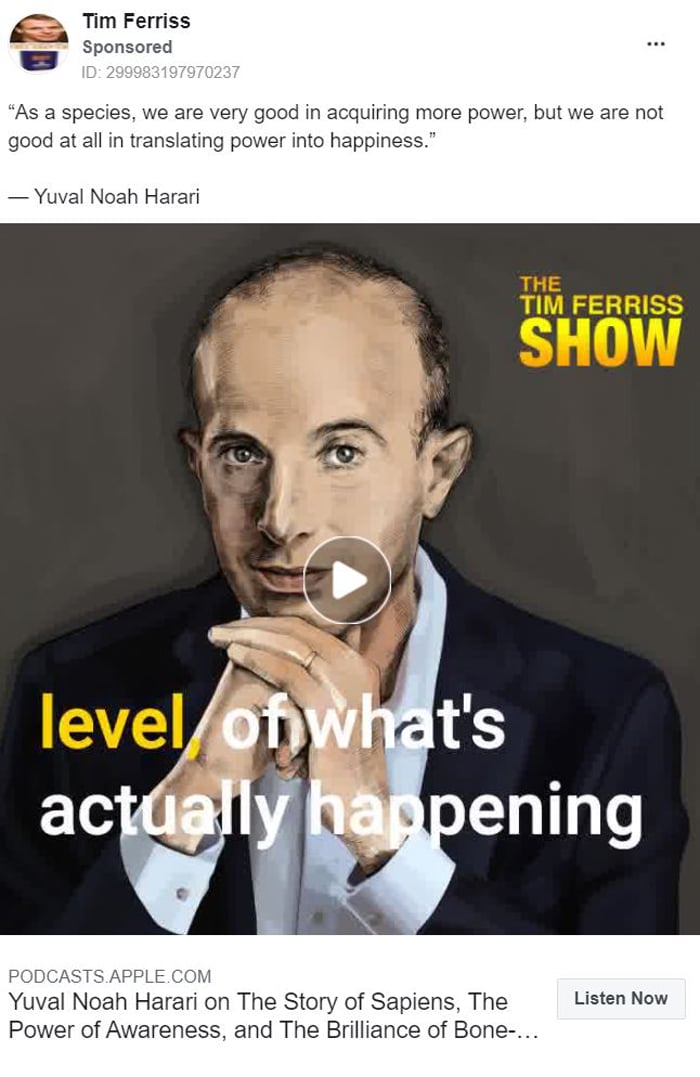
2. Target the Right Audience
Test PPC ads to narrow down your target audience.
When you know your audience, you can leverage ad targeting capabilities to lower your costs and improve conversions.
Let’s say you have an upcoming episode about cooking from a popular local celebrity. You can narrow your audience based on location and a particular theme of the episode.
Likewise, you can also promote podcasts by modifying targeting options based on an episode’s content. A/B testing can help identify the ideal ad sets and demographics of your target audience.
3. Test Your Ads
To increase CTR and decrease ad spend, test ads with different images or copy. Like Tim Ferris’ ad in the previous section, most podcast ads consist of an audiogram or a short clip with subtitles.
I recommend testing various audiograms to find out which works best in generating clicks or conversions. You can also lead users to the website or landing page where they can listen or download the particular podcast episode featured in the ad.
4. Monitor Your Podcast Ad Results
Most advertising platforms provide analytics to track the results of your campaigns. Facebook campaigns can be tracked with Facebook Analytics while Instagram ads can be tracked with Instagram analytics, and so forth.
For every social media platform you use, check the data consistently. Use this information to improve the paid ad campaigns in that channel.
Examples of Paid Ads for Podcast Promotions
Not sure how to promote podcasts with paid ads? We’ve compiled a list of compelling examples to inspire your own.
1. iHeartRadio
iHeartRadio’s paid ad aimed to promote their Ron Burgundy podcast. It includes a short audiogram which provides listeners a sneak peek of their discussion on how the brain works. Curious listeners may be compelled to click the ad to listen to the entire episode.
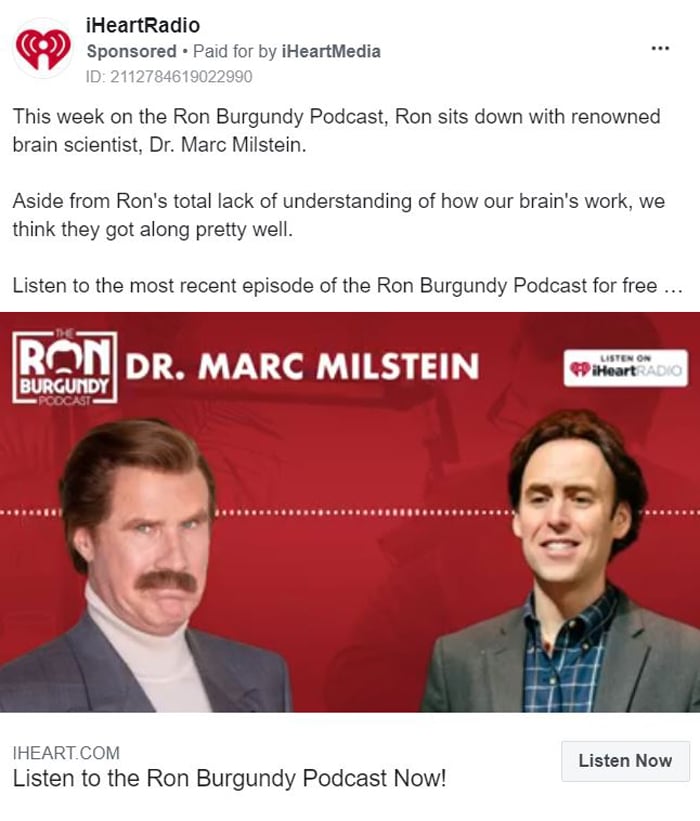
2. Goldman Sachs
Podcast ads usually have an audiogram, but it doesn’t mean your ads should stick to the norm.
The Exchanges at Goldman Sachs podcast features a behind-the-scenes video of the hosts speaking on-air. The subtitles let viewers understand the topic of conversation even when the video is on mute.
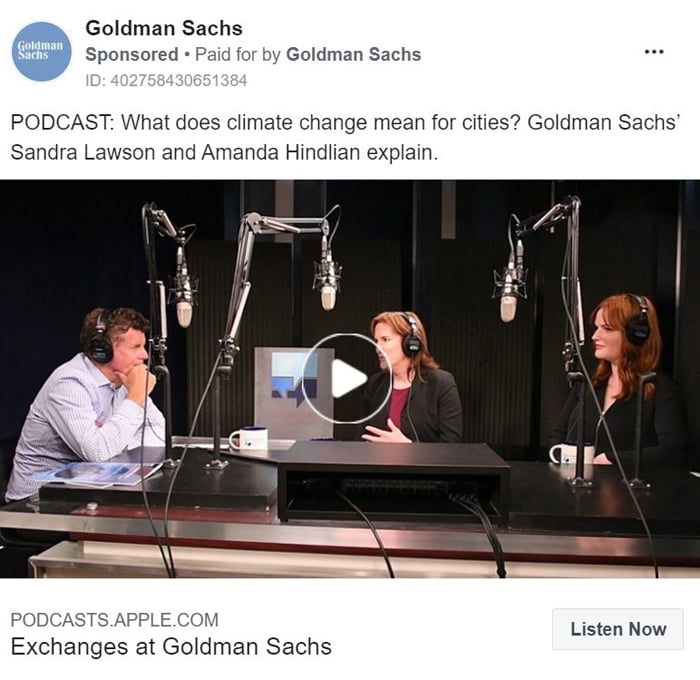
3. Pfizer
The Antigen podcast by Pfizer explores the political, scientific, and cultural elements of vaccination.
Their paid ad begins with the compelling question, “Do you like podcasts or science?” If the answer is yes, you can check out their podcast about COVID-19, potential treatments, and past pandemics.
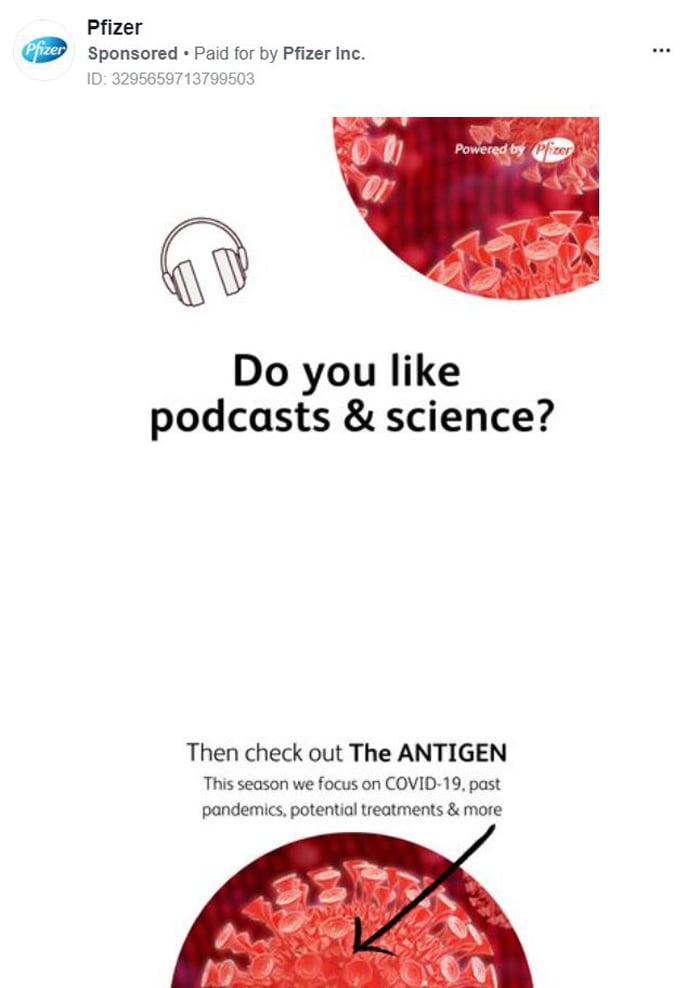
4. March of Dimes
March of Dimes podcast shares stories on pregnancy, parenthood, and loss.
Their paid ad campaign shared a snippet of a father’s inspiring story with his little girl born prematurely. The caption and the featured snippet will draw new parents’ who can relate to the content.
They also have an image of a mother cradling a baby, which can attract the attention of parents.
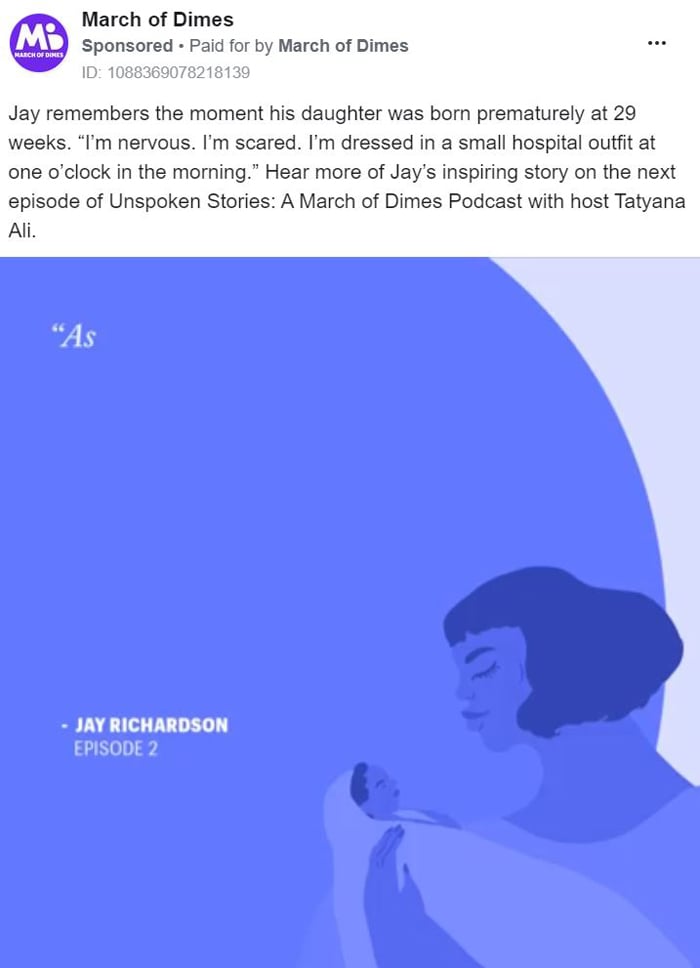
Conclusion
Paid ad campaigns can help boost awareness for your podcast and attract new listeners.
To maximize your results, use a compelling image, target the right audience, test paid ads, and make sure to monitor results. Tracking and measuring the success of your podcast promotion campaign will also help you monitor your results.
As you get more data, you can determine the most effective ad type and ideal targeting techniques for cost-effective spending. Here’s to hoping these tips will help you to promote your podcast and grow your audience.
How will you promote podcasts?
from Blog – Neil Patel https://ift.tt/3cbNxWg
via IFTTT
No comments:
Post a Comment